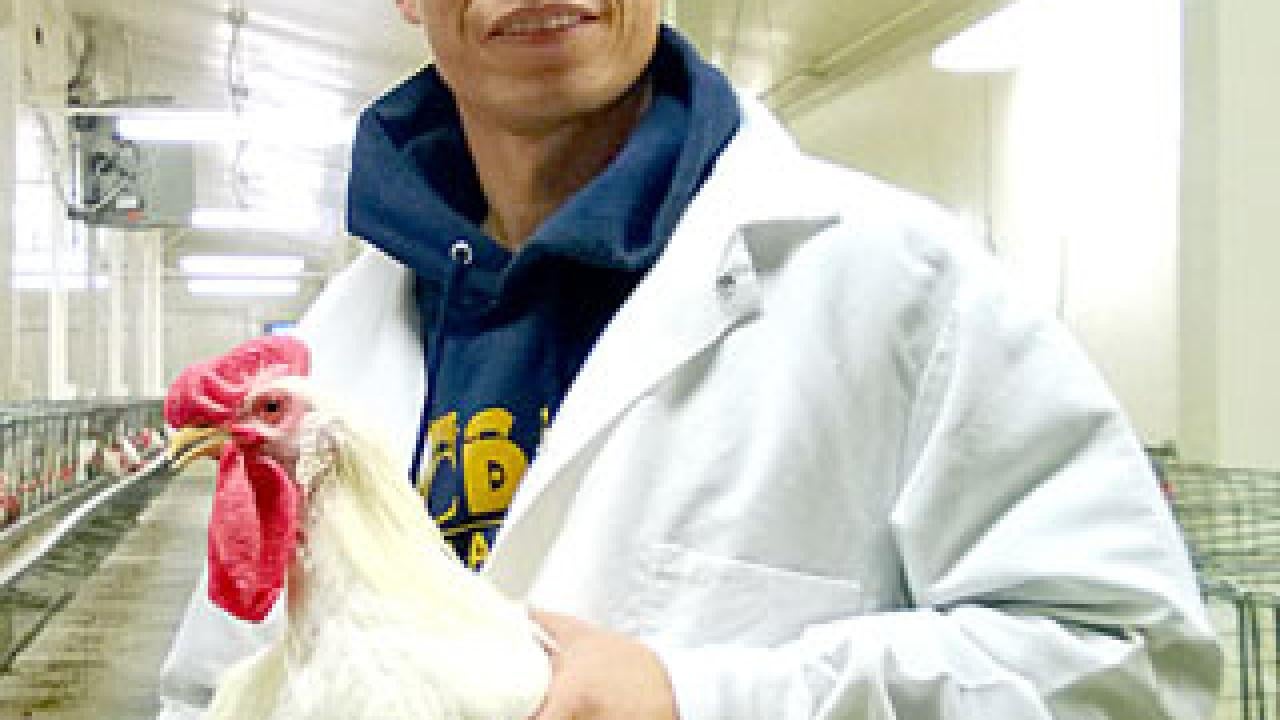A new program that will identify genes crucial for breeding chickens that can tolerate hot climates and resist infectious diseases — specifically the devastating Newcastle disease — has been launched under the leadership of the University of California, Davis.
The global economic impact of virulent Newcastle disease is enormous. The project is particularly important for Africa, where infectious diseases annually cause approximately 750 million poultry deaths. Newcastle disease, a global threat to food security, first appeared in 1950 in the United States. In 2002 it resulted in the death of 4 million birds at more than 2,600 California locations and cost $160 million to eradicate.
The new effort, called the Feed the Future Innovation Lab for Genomics to Improve Poultry, aims to dramatically increase chicken production among Africa’s rural households and small farms, advancing food security, human nutrition and personal livelihoods. The innovation lab recently was established with a $6 million grant from the U.S. Agency for International Development as part of Feed the Future, the U.S. government’s global hunger and food security initiative.
Huaijun Zhou, principal investigator for the program and an associate professor of animal science in the College of Agricultural and Environmental Sciences at UC Davis, noted that disease resistance is one of the most economically important traits for poultry production but also challenging to achieve through genetic selection and traditional breeding alone.
“We are thrilled by the opportunity to apply cutting-edge technology and advanced genomics to solve this problem in poor, developing countries,” said Zhou, whose research focuses on the relationship between genetics and the immune system.
“Developing a chicken that can survive Newcastle disease outbreaks is critical to increase poultry, meat and egg production in Africa and in other regions of the world,” said David Bunn, director of the new innovation lab. “Increasing the production of chickens and eggs can have a dramatic impact on the livelihoods of poor rural communities.”
Homestead and small-scale poultry production is considered to have tremendous potential for alleviating malnutrition and poverty in Africa’s climate-stressed rural communities. Improving the productivity of such poultry operations also promises to improve incomes and nourishment for women and children, who typically raise poultry for both income and food in Africa.
Collaborating with Zhou and Bunn at UC Davis are Rodrigo Gallardo, an assistant professor in the School of Veterinary Medicine, and Ermias Kebreab, a professor in the Department of Animal Science. The UC Davis team will partner with animal science professors Sue Lamont and Jack Dekkers, both at Iowa State University; Boniface Kayang, head of the Department of Animal Science at the University of Ghana; poultry health expert Peter Msoffe of Sokoine University of Agriculture in Tanzania; and Carl Schmidt, a professor of animal science at the University of Delaware.
About USAID and Feed the Future
The U.S. Agency for International Development (USAID) is an independent agency that provides economic, development and humanitarian assistance around the world in support of foreign policy goals of the United States. As stated in the President’s National Security Strategy, USAID’s work in development joins diplomacy and defense as one of the key pieces of the nation’s foreign policy apparatus. USAID promotes peace and stability by fostering economic growth, protecting human health, providing emergency humanitarian assistance, and enhancing democracy in developing countries. These efforts to improve the lives of millions of people worldwide represent U.S. values and advance U.S. interests for peace and prosperity.
Feed the Future is the U.S. Government’s global hunger and food security initiative. Feed the Future supports partner countries in developing their agriculture sectors to spur economic growth and trade that increase incomes and reduce hunger, poverty and undernutrition.
Media Resources
Pat Bailey, Research news (emphasis: agricultural and nutritional sciences, and veterinary medicine), 530-219-9640, pjbailey@ucdavis.edu
Huaijun Zhou, Animal Science, (530) 752-1034, hzhou@ucdavis.edu
